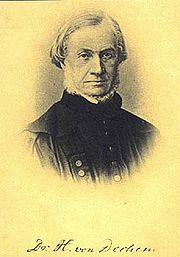
Ernst Heinrich Karl von Dechen
Encyclopedia

Germany
Germany , officially the Federal Republic of Germany , is a federal parliamentary republic in Europe. The country consists of 16 states while the capital and largest city is Berlin. Germany covers an area of 357,021 km2 and has a largely temperate seasonal climate...
geologist
Geologist
A geologist is a scientist who studies the solid and liquid matter that constitutes the Earth as well as the processes and history that has shaped it. Geologists usually engage in studying geology. Geologists, studying more of an applied science than a theoretical one, must approach Geology using...
.
He was born in Berlin
Berlin
Berlin is the capital city of Germany and is one of the 16 states of Germany. With a population of 3.45 million people, Berlin is Germany's largest city. It is the second most populous city proper and the seventh most populous urban area in the European Union...
, and was educated at the University of Berlin. He subsequently studied mining in Bochum
Bochum
Bochum is a city in North Rhine-Westphalia, western Germany. It is located in the Ruhr area and is surrounded by the cities of Essen, Gelsenkirchen, Herne, Castrop-Rauxel, Dortmund, Witten and Hattingen.-History:...
and Essen
Essen
- Origin of the name :In German-speaking countries, the name of the city Essen often causes confusion as to its origins, because it is commonly known as the German infinitive of the verb for the act of eating, and/or the German noun for food. Although scholars still dispute the interpretation of...
, and was in 1820 placed in the mining department of the Prussia
Prussia
Prussia was a German kingdom and historic state originating out of the Duchy of Prussia and the Margraviate of Brandenburg. For centuries, the House of Hohenzollern ruled Prussia, successfully expanding its size by way of an unusually well-organized and effective army. Prussia shaped the history...
n state, serving on the staff until 1864. Dechen was a professor at the University of Berlin from 1834-41, after which he became director of the Prussian mining department while stationed at Bonn
Bonn
Bonn is the 19th largest city in Germany. Located in the Cologne/Bonn Region, about 25 kilometres south of Cologne on the river Rhine in the State of North Rhine-Westphalia, it was the capital of West Germany from 1949 to 1990 and the official seat of government of united Germany from 1990 to 1999....
.
In the early years he made journeys to study the mining systems of other countries, and with this object he visited England and Scotland in company with Karl von Oeynhausen (1797-1865). In the course of his work he paid special attention to the coal
Coal
Coal is a combustible black or brownish-black sedimentary rock usually occurring in rock strata in layers or veins called coal beds or coal seams. The harder forms, such as anthracite coal, can be regarded as metamorphic rock because of later exposure to elevated temperature and pressure...
-formation of Westphalia
Westphalia
Westphalia is a region in Germany, centred on the cities of Arnsberg, Bielefeld, Dortmund, Minden and Münster.Westphalia is roughly the region between the rivers Rhine and Weser, located north and south of the Ruhr River. No exact definition of borders can be given, because the name "Westphalia"...
and northern Europe generally, and he greatly furthered the progress made in mining and metallurgical works in Rhenish Prussia.
He made numerous contributions to geological literature; notably the following:
- Geognostische Umrisse der Rheinländer zwischen Basel und Mainz mit besonderer Rücksicht auf das Vorkommen des Steinsalzes (with von Oeynhausen and La Roche), 2 vols. (Berlin, 1825).
- Geognostische Führer in das Siebengebirge am Rhein (Bonn, 1861)
- Die nutzbaren Mineralien und Gebirgsarten im deutschen Reiche (1873)
The work that gave him the most renown was a geological map of Rhenish Prussia and Westphalia in 35 sheets on the scale of 1-80,000, issued with two volumes of explanatory text (1855-1882). He also published a small geological map of Germany (1869).
He died in Bonn in 1889.

